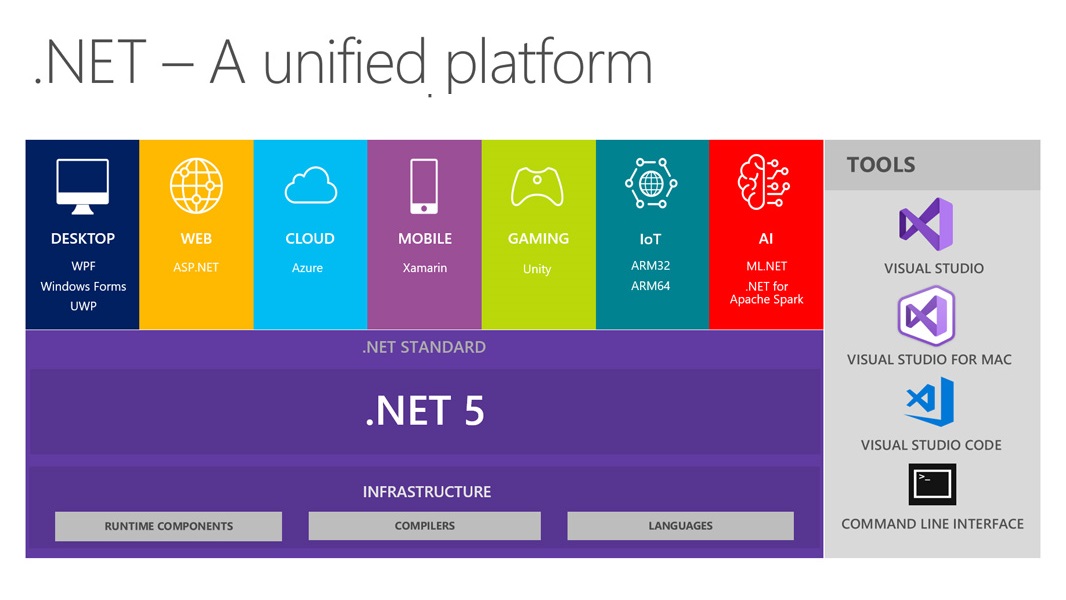Build 2019: Microsoft Announces .NET 5
- Paul Thurrott
- May 06, 2019
-
15

Microsoft announced that the next .NET release after .NET Core 3 will be branded as .NET 5, with the firm finally combining classic .NET with the open source .NET Core into a single platform.
“There will be just one .NET going forward, and you will be able to use it to target Windows, Linux, macOS, iOS, Android, tvOS, watchOS, and WebAssembly, and more,” Microsoft’s Richard Lander announced. “We will introduce new .NET APIs, runtime capabilities and language features as part of .NET 5.”
Windows Intelligence In Your Inbox
Sign up for our new free newsletter to get three time-saving tips each Friday — and get free copies of Paul Thurrott's Windows 11 and Windows 10 Field Guides (normally $9.99) as a special welcome gift!
"*" indicates required fields
As you may know, .NET Core is essentially the open source and cross-platform version of Microsoft’s proprietary .NET platform, which is often referred to as the .NET Framework. The issue for .NET Core, to date, has been that it offered only a subset of .NET Framework functionality on Windows. This made it impossible for some developers to migrate existing code bases to the new platform.
So, Microsoft has evolved. NET Core since its initial release in 2016, adding over 50,000 NET Framework APIs to the platform. With .NET Core 3, the firm added most .NET Framework 4.8 functionality and enabled support for Windows Forms, WPF, and Entity Framework 6.
Now, the next release, now called .NET 5, will be a single platform that can replace both .NET Core 3 and .NET Framework 4.8. It will ship in November 2020, with the first preview available in the first half of 2020, Microsoft says. And it will be supported with future updates to Visual Studio 2019, Visual Studio for Mac, and Visual Studio Code.
Microsoft says that the goal for .NET 5 is to produce a single .NET runtime and framework that can be used everywhere and that has uniform runtime behaviors and developer experiences, to expand the capabilities of .NET by combining the best features from .NET Core, .NET Framework, Xamarin and Mono, and to build that product out of a single code-base that can work on and expand together. It will continue to be open-source, of course.
More specifically, .NET will support Java and will eventually support both Objective-C and Swift too. Pretty amazing.
Conversation 15 comments
-
skane2600
<p>Goals are great but ultimately the only thing that counts is what is delivered. Call me skeptical. I still remember "one windows" that didn't actually deliver the same functionality on every Windows device. For a single .NET platform to be truly significant, you should be able to design a sophisticated full-featured .NET program without having to think at all about which platform(s) it's supposed to run on or provide any platform-specific elements and have it work perfectly on all the systems that support the Framework.</p>
-
skane2600
<blockquote><em><a href="#426168">In reply to spivonious:</a></em></blockquote><p>I agree, which is why this isn't a very significant development. You don't need .NET 5 to create platform-specific programs, we've been doing it for decades.</p>
-
dontbe evil
<blockquote><em><a href="#426139">In reply to Jeff.Bane:</a></em></blockquote><blockquote><br></blockquote><p>yup, still waiting for a xaml standard cross platform (at least for xamarin.forms and UWP)</p>
-
dontbe evil
<blockquote><a href="#426254"><em>In reply to rmac:</em></a></blockquote><p>yup, still waiting for a xaml standard cross platform (at least for xamarin.forms and UWP)</p>